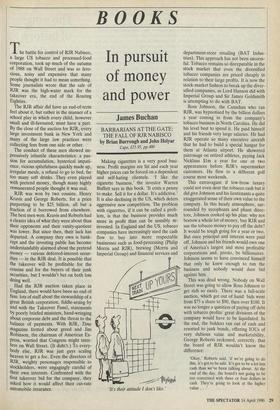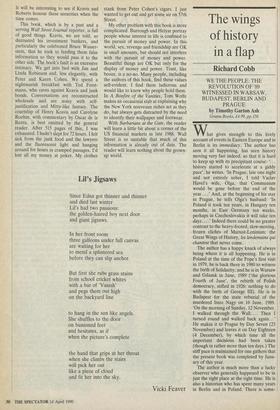BOOKS
In pursuit of money and power
James Buchan
BARBARIANS AT THE GATE: THE FALL OF RJR NABISCO by Brian Burrough and John Helyar
Cape, £15.95, pp.480
The battle for control of RJR Nabisco, a large US tobacco and processed-food corporation, took up much of the autumn of 1988 on Wall Street and was so fero- cious, noisy and expensive that many people thought it had to mean something. Some journalists wrote that the sale of RJR was the high-water mark for the takeover era, the end of the Roaring Eighties.
The RJR affair did have an end-of-term feel about it, but rather in the manner of a school play in which every child, however small and ill-favoured, must have a part. By the close of the auction for RJR, every large investment bank in New York and many of the large law practices were collecting fees from one side or other.
The conduct of these men showed im- pressively infantile characteristics: a pas- sion for accumulation, hysterical impati- ence, vicious spitefulness quickly made up, irregular meals, a refusal to go to bed, far too many soft drinks. They even played with pretend money, though many highly remunerated people thought it was real.
RJR was won by two cousins, Henry Kravis and George Roberts, for a price purporting to be $25 billion, all but a fraction of it borrowed from elsewhere. The best men won. Kravis and Roberts had a clearer idea of what they were about than their opponents and their vanity-quotient Was lower. But since then, their luck has departed. A company they own is bank- rupt and the investing public has become understandably alarmed about the pretend money — various deferred-interest secur- ities — in the RJR deal. It is possible that the takeover will be profitable for the cousins and for the buyers of their junk securities, but I wouldn't bet on both lots doing well.
Had the RJR auction taken place in England, there would have been no end of fuss: lots of stuff about the stewardship of a great British corporation, fiddle-arsing by and with the Takeover Panel, statements by poorly briefed ministers, hand-wringing about corporate debt and the threat to the balance of payments. With RJR, Time magazine fretted about greed and Jim Robinson, the chairman of American Ex- press, worried that Congress might inter- fere on Wall Street. (It didn't.) To every- body else, RJR was just guys scaling heaven to get a fee. Even the directors of RJR, weighty personages responsible to stockholders, were engagingly careful of their own interests. Confronted with the first takeover bid for the company, they asked how it would affect their cut-rate automobile insurance. Making cigarettes is a very good busi- ness. Profit margins are fat and each year higher prices can be forced on a dependent and self-hating clientele. 'I like the cigarette business,' the investor Warren Buffett says in this book. 'It costs a penny to make. Sell it for a dollar. It's addictive.' It is also declining in the US, which deters aggressive new competition. The problem with cigarettes, if it can be called a prob- lem, is that the business provides much more in profit than can be sensibly re- invested. In England and the US, tobacco companies have increasingly used the cash flow to buy into more respectable businesses such as food-processing (Philip Morris and RJR), brewing (Morris and Imperial Group) and financial services and
`It's their attitude I don't like.'
department-store retailing (BAT Indus- tries). This approach has not been success- ful. Tobacco remains so disreputable in the stock market that even the diversified tobacco companies are priced cheaply in relation to their large profits. It is now the stock-market fashion to break up the diver- sified companies, as Lord Hanson did with Imperial Group and Sir James Goldsmith is attempting to do with BAT.
Ross Johnson, the Canadian who ran RJR, was hypnotised by the billion dollars a year coming in from the company's tobacco business in North Carolina. He did his level best to spend it. He paid himself and his friends very large salaries. He had RJR operate so many executive aircraft that he had to build a special hangar for them at Atlanta airport. He showered patronage on retired athletes, paying Jack Nicklaus $1m a year for one or two appearances before RJR's supermarket customers. He flew to a different golf course most weekends.
This extravagant if low-brow luxury could not even dent the tobacco cash but it did give Johnson and his lieutenants a quite exaggerated sense of their own value to the company. In this heady atmosphere, sur- rounded by sycophants and pliant direc- tors, Johnson cooked up his plan: why not borrow a whole lot of money, buy RJR and use the tobacco money to pay off the debt? It would be tough going for a year or two. But once principal and interest were paid off, Johnson and his friends would own one of America's largest and most profitable corporations and, presto, be billionaires. Johnson seems to have convinced himself that only he knew enough to run the business and nobody would dare bid against Th isw him.
dead wrong. Nobody on Wall Street was going to allow Ross Johnson to get rich so easily. There was a full-scale auction, which got out of hand: bids went from $75 a share to $90, then over $100. It was no longer a question of paying off debt with tobacco profits: great divisions of the company would have to be liquidated. In the end, the bidders ran out of cash and resorted to junk bonds, offering IOUs of very dubious value and marketability. George Roberts reckoned, correctly, that the board of RJR wouldn't know the difference:
`Okay,' Roberts said, 'if we're going to do this, it's got to be safe. It's got to be a lot less cash than we've been talking about. At the end of the day, the board's not going to be too concerned with three or four dollars in cash. They're going to look at the higher value . . It will be interesting to see if Kravis and Roberts honour these securities when the time comes.
This book, which is by a past and a serving Wall Street Journal reporter, is full of good things. Kravis, we are told, so distrusted his investment bankers, and particularly the celebrated Bruce Wasser- stein, that he took to feeding them false information so they would pass it to the other side. The book's fault is an excessive intimacy. We get into bed with Jim and Linda Robinson and, less elegantly, with Peter and Karen Cohen. We spend a nightmarish breakfast with Ted Forst- mann, who raves against Kravis and junk bonds. Conversations are reconstructed wholesale and are noisy with self- justification and Mitty-like fantasy. The courtship of Henry Kravis and Carolyne Roehm, with commentary by Oscar de la Renta, is best omitted by the general reader. After 515 pages of this, I was exhausted. I hadn't slept for 72 hours. I felt sick from the junk food and the lawyers and the fluorescent light and hanging around for hours in cramped passages. I'd lost all my money at poker. My clothes
stank from Peter Cohen's cigars. I just wanted to get out and get some air on 57th Street.
My other problem with this book is more complicated. Burrough and Helyar portray people whose interest in life is confined to the purusit of money and power. In this world, sex, revenge and friendship are OK in small amounts, but should not interfere with the pursuit of money and power. Beautiful things are OK but only for the display of money and power. Trust, like booze, is a no-no. Many people, including the authors of this book, find these values self-evident. I find them ludicrous and would like to know why people hold them. In A Bonfire of the Vanities, Tom Wolfe makes an occasional stab at explaining why the New York nouveaux riches act as they do, but always gets distracted by the need to identify their wallpaper and footwear.
With Barbarians at the Gate, the reader will learn a little bit about a corner of the US financial markets in late 1988. Wall Street is so unstable that much of this information is already out of date. The reader will learn nothing about the grown- up world.



















































 Previous page
Previous page